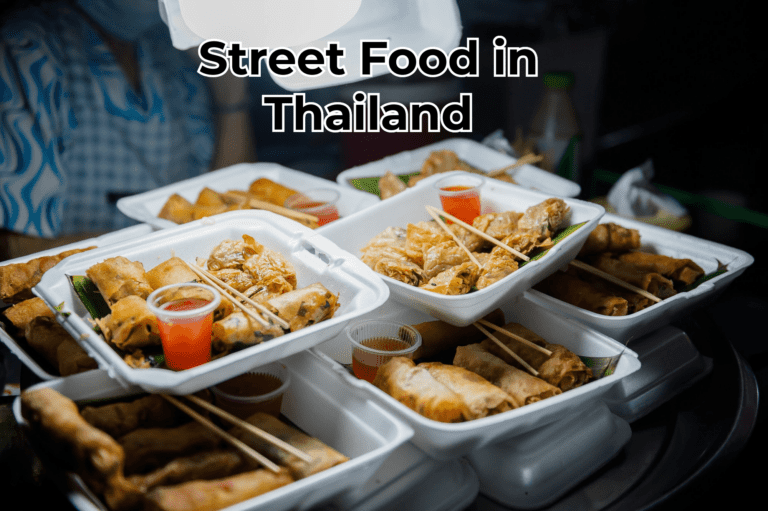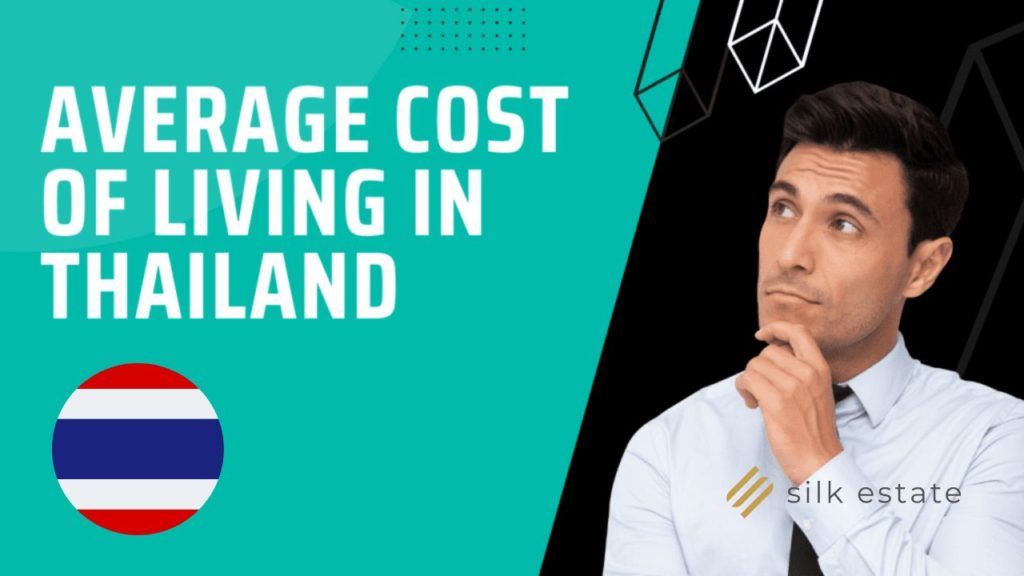Thailand is a popular Southeast Asian destination for travellers, expats, students, and professionals from around the world. From the stunning beaches to its delicious food and friendly locals, there’s something for everyone in Thailand but what does it cost? let’s take a look at the average cost of living in Thailand.
If you’re planning to relocate to Thailand, one of the first things that you may wonder is what is the cost of living in Thailand in cities like Bangkok or Phuket.
While Thailand is generally an affordable country to live in compared to many other countries and offers a better quality of life and lower spending, it is important to consider the cost of necessities like housing, utilities, food, and transportation when planning and budgeting for your move to Thailand.
It’s important to remember that Inflation and fuel costs are soaring across Europe, the UK, and the United States. With rising fuel bills for heating homes, increasing food prices, and higher interest rates on mortgages and car loans, the financial burden is becoming more challenging.
Given these circumstances, many are considering relocating to Thailand, either permanently or as seasonal residents. Thailand offers a more affordable and comfortable lifestyle, making it an attractive option in these times of economic strain.
Keep reading as we take a look at the average costs of living in Thailand to help you plan for your move to this amazing destination.
Why Live In Thailand?
Thailand is a stunning country known for its rich culture, warm hospitality, and affordable cost of living. It’s no surprise that Thailand has become one of the top destinations for expats worldwide.
But what can you expect when it comes to living in Thailand?
In this guide, we’ll cover all the essentials, from monthly income and living expenses to housing and healthcare. We’ll also explore other key factors to consider when deciding whether or not to make the move to Thailand.
What is The Average Monthly Imcome?
The average monthly income for expats working in Thailand typically ranges between $1,500 and $2,000. Of course, this can vary depending on your job, skillset, and industry. However, in general, this salary allows for a comfortable lifestyle in Thailand, especially if you’re accustomed to a lower cost of living outside of major cities like Bangkok or Chiang Mai.
If you’re considering relocating to Thailand, understanding the cost of living and potential income is crucial. With this income range, many expats find that they can afford quality housing, healthcare, and a vibrant social life, making Thailand an attractive destination for those looking to live abroad.

Living Expenses on a $1,000 Budget in Thailand.
Your monthly living expenses in Thailand will vary depending on your lifestyle and where you choose to live. Opting for a rural area or smaller town will generally result in lower costs compared to living in major cities like Bangkok or Pattaya.
On average, you can expect to spend between $700 and $1,000 per month. This budget typically covers essentials such as housing, food (including street vendors and restaurants), transportation, utilities, and entertainment. However, if you have a family or dependents, your expenses may be higher.
If you are someone that lives life on a budget then you can move to Thailand with just $10,000 US dollars a year and live comfortably.
Living Expenses Without Budget in Thailand.
If you’re planning to live in Thailand without a strict budget, your monthly expenses will largely depend on your lifestyle, location, and personal preferences. Major cities like Bangkok and Pattaya offer a range of high-end options, from luxury apartments and gourmet dining to premium entertainment and international shopping.
For those with a monthly budget of $5,000 to $10,000, Thailand offers an exceptionally high standard of living. Here’s what you can expect:
Luxury Housing: With this budget, you can afford to rent or even purchase a high-end condo or villa in prime locations such as Bangkok, Pattaya, Phuket, or Chiang Mai. Expect to pay between $2,000 and $5,000 per month for a modern, spacious condo with amenities like a pool, gym, and 24-hour security, or more for a private villa with ocean views.
Fine Dining and Entertainment: You can indulge in gourmet dining at top-rated restaurants, frequent upscale bars and clubs, and enjoy exclusive entertainment options. Dining out at high-end restaurants might cost between $50 and $200 per meal, depending on the cuisine and setting.
Premium Healthcare: With access to Thailand’s top-tier private hospitals and clinics, you can receive world-class medical care at a fraction of the cost compared to Western countries. Comprehensive health insurance plans for expats can range from $200 to $1,000 per month, depending on coverage.
Transportation: You can afford to own and maintain a luxury vehicle, hire a personal driver, or use ride-sharing services daily without concern for cost. Leasing a high-end car could range from $800 to $2,000 per month.
Exclusive Memberships: Your budget allows for memberships at exclusive clubs, golf courses, and fitness centers, as well as participation in high-end recreational activities like yachting or private tours.
In general, living in a more urbanized area will naturally lead to higher costs compared to smaller towns or rural regions. However, Thailand also offers the flexibility to enjoy a high standard of living without breaking the bank. By mixing luxury with more affordable options, many expats find that they can enjoy a comfortable and fulfilling lifestyle tailored to their preferences.
Comparing the Cost of Living in Thailand to Western Countries.

When comparing the cost of living in Thailand to that of Western countries, several factors influence the overall expenses, including your specific location within Thailand or the Western country, the cost of housing and other essentials, and personal lifestyle choices.
1. Housing Costs: In general, the cost of living in Thailand is significantly lower than in many Western countries, particularly when it comes to housing. For instance, the average rent in Thailand is much more affordable than in countries like the United States, Canada, or Australia. Whether you choose to live in a bustling city like Bangkok or a more rural area, housing expenses are typically lower than in major Western cities.
2. Food and Dining: Similarly, the cost of groceries and dining out in Thailand is generally lower compared to Western nations. Eating at local restaurants, especially in non-tourist areas, is often extremely affordable. Even dining at mid-range restaurants in cities like Chiang Mai or Phuket is typically cheaper than in Western cities.
3. Healthcare and Insurance: While healthcare in Thailand is of high quality, especially in private hospitals, the cost of healthcare and insurance can sometimes be higher than in some Western countries, depending on the level of coverage and the provider. However, many expats find that Thailand offers excellent medical care at a fraction of the cost compared to the U.S. or Europe.
4. Luxury Goods and Imports: It’s also important to note that certain imported goods and luxury items can be more expensive in Thailand due to import taxes and higher demand. This includes products like electronics, branded clothing, and imported foods. If you prefer Western brands or luxury items, you might find yourself paying a premium compared to prices in your home country.
5. Overall Cost of Living: Ultimately, the cost of living in Thailand can vary widely depending on your location, lifestyle, and personal preferences. While necessities like housing, food, and local transportation are generally more affordable, the costs for certain goods, services, and international standards of living can be comparable or higher. It’s essential to carefully assess your budget and priorities when comparing the cost of living in Thailand to that of Western countries.
What Are The Regional Variations in the Cost of Living in Thailand.

Thailand offers diverse living environments, and the cost of living can vary significantly across different regions. Understanding these regional variations is crucial for anyone considering relocating to Thailand.
1. Urban Areas:
Cities like Bangkok and Chiang Mai typically have higher living costs compared to smaller cities or rural areas. In Bangkok, for example, the demand for housing, especially in central districts, drives up rental prices. Additionally, the cost of dining out, transportation, and entertainment is generally higher in these urban centers due to the availability of more upscale options and the higher standard of living.
2. Smaller Cities and Rural Areas:
In contrast, the cost of living in smaller cities or rural areas is usually much lower. Places like Isaan in the northeastern region or towns in the central plains offer more affordable housing, lower food costs, and cheaper local services. The slower pace of life in these areas often translates to fewer expenses, making them attractive to those seeking a quieter, more budget-friendly lifestyle.
3. Tourist Hotspots:
Regions that attract a lot of tourists, such as Phuket, Koh Samui, and Pattaya, tend to have higher costs of living, especially in terms of accommodation and dining. Beach towns and resorts in these areas often cater to tourists, which can drive up prices for vacation rentals, restaurants, and entertainment. Even basic services may cost more due to the high demand from visitors.
4. Northern vs. Southern Thailand:
Northern Thailand, including cities like Chiang Rai and Pai, is generally less expensive than the southern regions, especially the islands and coastal areas. The northern region is known for its cooler climate and mountainous landscapes, which offer a different lifestyle and typically lower costs for housing and daily expenses. In contrast, the southern region, with its beaches and warmer weather, often sees higher prices due to its popularity among both tourists and expats.
5. Proximity to Tourist Attractions:
Areas close to major tourist attractions or natural landmarks can also see a rise in living costs. For instance, living near historical sites in Ayutthaya or the natural parks in Krabi might mean paying a premium for housing and other services due to the influx of visitors.
What Is The Cost Of A House In Thailand.

The cost of buying a house in Thailand varies significantly based on the city, type of property, and location. Here’s a comprehensive overview of what you need to know about house prices in Thailand:
1. Apartment Prices:
For a quality apartment in Thailand, you can expect to pay between $100,000 and $140,000. This price range typically covers a well-furnished, 45-square-meter unit in a desirable city area. Cities like Bangkok and Chiang Mai may see higher prices due to their central locations and demand for real estate.
2. Villa Prices:
If you’re interested in purchasing a villa, the starting price for a luxurious property is around $200,000. Villas offer more space and often come with amenities such as private pools and gardens. Locations like Phuket, Pattaya, and Samui are popular for villa purchases and might have higher prices based on the property’s proximity to the beach or other attractions.
3. Financing Options:
Many developers offer interest-free installment plans to make purchasing property more accessible. Additionally, early buyers might benefit from discounts of up to 40%. This can significantly reduce the overall cost and make high-quality properties more affordable.
4. Regional Variations:
Prices can also vary based on the region. For example, real estate in major cities such as Bangkok and Phuket tends to be more expensive compared to smaller towns or rural areas. If you’re considering purchasing property in a less developed area, you might find more competitive pricing.
5. Additional Costs:
Be aware of additional costs such as legal fees, property taxes, and maintenance expenses. These can add to the overall cost of buying and maintaining a property in Thailand.
Whether you’re looking for a city apartment or a luxury villa, understanding the typical costs and available financing options will help you make an informed decision. For the best deals and to explore financing opportunities, contact us to learn more about current offers and discounts.
The Cost of Rent and Amenities In Thailand.
If you’re planning to rent a home in Thailand, you can expect to pay between $330 and $550 per month for a 30 sq meter studio room in Bangkok. In more upscale areas like Silom, you might pay anywhere from $650 to $800 for a similar-sized studio.
In cities like Samut Prakan, it’s common to find independent houses that can be rented for as little as $450 per month. These houses often have around 80 sq meters of space and may include a backyard and porch. However, in Bangkok, a similar house would likely cost at least $800 per month. It’s worth noting that it’s possible to negotiate for a lower rent in many cases in Thailand, and some renters have been able to secure a reduction of up to 40% with the right negotiation strategy.
If you prefer to rent a single room in a managed property service like Airbnb, you might pay a higher amount (between 20-50%) for the same size room, but the rent will typically include maintenance and other basic amenities.
Read: Compare the difference between booking an Airbnb and renting in Bangkok.
Keep in mind that if you’re a foreigner renting a place in your own name, most landlords will ask for a refundable deposit equal to two month’s rent and the first month’s rent in advance. In some cases, landlords in cities like Bangkok may also ask for an additional month’s rent as a security deposit, but this is not always the norm. In cities like Chiang Mai, where rental costs are lower, the security deposit may also be proportionately lower.
Alternatively, you may choose to lease a house in Thailand. In this case, you’ll likely pay a fixed amount for the lease for a certain duration, with additional fees for amenities on a per-month basis. The cost of leasing a house will depend on factors like the size of the house (in sq meters), the term and tenure of the lease, and any plans for building or renovations. The terms of the lease will be agreed upon by the lessor and tenant.
Read: Top residential area where most people live when they move to Thailand.
Having lived in Thailand for a while, I cannot deny, it is an amazing place to live. The food is delicious, the people are friendly, it’s exciting with plenty to do and the cost of living is relatively low compared to many Western countries. That being said, it’s still important to budget carefully and understand the average costs of living in Thailand in 2024.
The Cost of Electricity and Water in Thailand.
“Having a constant supply of electricity and water is essential in Bangkok, although some cities in Thailand may experience occasional power cuts. The cost of these utilities can vary widely depending on the size and location of your home. For example, a one-room studio apartment might pay around $40 per month for electricity and water, while a four-bedroom villa might pay as much as $300 per month. These estimates assume that you’re using the air conditioning unit while you sleep and conserving energy by turning off lights, fans, and ACs when you’re not home.
The cost of water is generally lower than electricity, with an average cost of $4 per month for a one-room studio apartment and $25 per month for a four-bedroom villa. Of course, these costs will depend on your usage and any wastage. It’s worth noting that many condo developers in Thailand offer units with rainwater harvesting systems, which can be a complimentary amenity for residents.
The Cost of Food, Coffee, and Alcohol in Thailand.

There’s no limit to how much you can spend on food and alcohol when you go out to pubs and nightclubs in Thailand. On a budget, you might expect to spend around $100 for a night out, but this will only go so far. Alcohol isn’t particularly expensive in Thailand, but many upper-class establishments charge premium prices for top-shelf brands and the ambiance of the venue. It’s worth noting that additional taxes are often levied on food, alcohol, coffee, and other consumables.
If you’re looking to save money on food, street food and local restaurants can be a good option. A filling meal from one of these venues might cost as little as $2. Alternatively, you might pay anywhere from $4 to $10 per meal at a smaller chain restaurant. A full course meal at a fancy sushi restaurant could cost around $20 per person.
Coffee is also a popular drink in Thailand, with an estimated consumption of 30 million Thai baht per year. However, the majority of this revenue comes from instant coffee and three-in-one packs that can be easily made at home. If you’re a fan of coffee (like me!), you have a few options for better-tasting coffee. If you prefer to go out for coffee, you might pay around $4 per cup at chain establishments like Starbucks, or $2 at a local coffee shop with WiFi and charging facilities. Alternatively, you can buy a coffee maker in Thailand for as little as $50 to $300, with coffee packets costing around $10 – 30 per month. Of course, you can also find more expensive coffee makers and gourmet instant coffee powders if you prefer.
The cost of food and drink in Thailand can vary widely depending on your preferences and lifestyle. If you’re looking to save money, street food and local restaurants can be a good options, while more upscale establishments will naturally cost more. The same is true for coffee, with instant coffee and home brewing being the most budget-friendly options, while going out for coffee or purchasing high-end equipment and products will cost more. Overall, it’s important to budget carefully and consider your personal preferences when planning your food and drink expenses in Thailand.
The Cost of Transportation in Thailand.
One of the main benefits of living in a city like Bangkok is the convenient and affordable public transportation system. The underground MRT and BTS Skytrain both offer connectivity to every corner of the city, though there are many options you can take and generally transportation in Thailand is generally affordable and convenient, with a range of options to suit your needs and budget.
BTS Skytrain:
This elevated train system connects many parts of the city and is a popular choice for tourists and locals alike. The fare ranges from 15-65 baht (about $0.50-$2.10) depending on the distance traveled.
Learn more about the BTS Skytrain in Bangkok
MRT Underground:
This subway system serves many areas of the city and is a convenient way to get around. The fare ranges from 16-40 baht (about $0.50-$1.30) depending on the distance traveled.
Bus:
The Bangkok Mass Transit Authority (BMTA) operates a comprehensive bus network throughout the city. Fares range from 6-40 baht (about $0.20-$1.30) depending on the distance traveled and the type of bus.
Taxis:
Metered taxis are readily available throughout the city and can be hailed on the street or booked in advance through a ride-hailing app. Fares start at 35 baht (about $1.15) for the first 2 kilometers and increase by about 5 baht (about $0.15) per kilometer thereafter.
Tuk-tuks:
These small, three-wheeled vehicles are a popular choice for short trips and offer a more unique transportation experience. Prices can vary widely from can cost anywhere from $5 to $50 depending on the distance traveled and the negotiation skills of the passenger.
Other Factors That Affect the Average Cost of Living in Thailand.
There are various other factors that can contribute to the overall cost of living in Thailand, including transportation, insurance, phone plans, and the cost of buying or leasing property.
Here are 7 contributing factors to cost in Thailand:
Insurance costs in Thailand:
One factor to consider when budgeting for the average cost of living in Thailand is the cost of insurance. Many expats living in Thailand as students, working professionals, or retirees choose to purchase health and life insurance to provide peace of mind while living in a foreign country. There are several reputable insurance companies that offer policies for expats, with premiums starting as low as $10 per month for young adults without any pre-existing health conditions or driving experience.
Keep in mind that the cost of insurance in Thailand will vary depending on your personal circumstances and the level of coverage you choose. It’s important to do your research and compare policies from different companies to find the best fit for your needs and budget.
Phone plan costs in Thailand:
Another factor to consider when calculating the average cost of living in Thailand is the cost of phone and data plans. If you’re planning to stay connected while in Thailand, you have a few options to choose from. Basic phone plans with limited calling and data start at around $10 per month, with the option to add more as needed. If you need more data and calling time, you can find unlimited mobile plans starting at around $30 per month.
If you prefer to have a home Wi-Fi connection, you can find a router and plan for as little as $20 per month, which includes 200 Mbps speeds and a 100 GB data limit. As with any phone or data plan, it’s important to consider your personal usage and needs when selecting a package to ensure you get the best value for your money.
Thai Insurance costs:
Gym, sauna and spa memberships for basic amities in most gyms start at $35 a month. If you wish for a personal trainer during your workouts then the add-on cost for this would be $20 to $30 per session. Muay Thai Gyms offer complete packages that cost $200 a month and there is a myriad of these gyms in Thailand that offer step-by-step classes for beginners. Note that many condo complexes offer built-in gyms to their members at no additional cost and these gyms are usually fully equipped and have an attached sauna as well.
Health care:
If you’re planning on living in Thailand long-term, you’ll want to make sure you have access to reliable and affordable health care. While some expats opt to pay out-of-pocket for private medical treatment, others choose to purchase health insurance to cover their medical costs.
Entertainment:
Thailand is known for its vibrant nightlife, with a wide range of options for entertainment ranging from live music to cultural festivals. Of course, these activities can add up, so it’s important to budget accordingly.
Education:
If you have children, you’ll need to consider the cost of education in Thailand. While private schools can be expensive, there are also many reputable public schools that offer a good education at a lower cost.
Miscellaneous expenses:
There are always unexpected expenses that come up when living in a new place, so it’s important to save some extra money for these contingencies.
Overall, the average cost of living in Thailand will depend on your personal circumstances and preferences. By carefully considering all of these factors and budgeting accordingly, you can make the most of your time in this amazing country.”
To summarize the cost of living in Thailand.
The cost of living in Thailand will depend on your desired lifestyle and personal preferences. If you’re looking to live frugally, it is possible to enjoy a fun and fulfilling lifestyle for around $1500 per month. However, if you want to eat at top restaurants and live in luxury properties, you should budget closer to $5000 per month.
It’s important to keep in mind that these estimates are general and may vary based on your location and specific lifestyle choices. However, with careful planning and budgeting, it is possible to live an affordable and enjoyable life in Thailand no matter what your budget may be.
Investing in Property in Thailand: Tips and Assistance.
If you’re interested in investing in property in Thailand, you may be eligible for a mortgage with a Thai bank, with loan terms of up to 30 years. It’s important to work with reliable real estate agents like Silk Estate to find the best property options and ensure a smooth process.
Silk Estate can assist you in purchasing luxury Thai property and also offer managed property services if you plan to rent out your property while living overseas.
Contact us to learn more about how we can help you navigate the process of purchasing and managing property in Thailand as a foreign property investor, and add value to your property purchase while minimizing the stress of being a foreign real estate investor in Thailand.
Ready to buy a property in Thailand?
Contact Silk Estate today to start your search for the perfect condo.
You may be interested in this post >>> Things To Keep In Mind While You Buy A Condo in Bangkok.
You may also be interested in this post >>>Top 10 Reasons To Become An Expat and Move To Thailand In 2023




